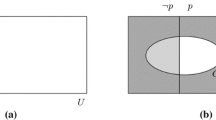Abstract
I develop a strategy for representing epistemic states and epistemic changes that seeks to be sensitive to the difference between voluntary and involuntary aspects of our epistemic life, as well as to the role of pragmatic factors in epistemology. The model relies on a particular understanding of the distinction between full belief and acceptance, which makes room for the idea that our reasoning on both practical and theoretical matters typically proceeds in a contextual way. Within this framework, I discuss how agents can rationally shift their credal probability functions so as to consciously modify some of their contextual acceptances; the present account also allows us to represent how the very set of contexts evolves. Voluntary credal shifts, in turn, might provoke changes in the agent’s beliefs, but I show that this is actually a side effect of performing multiple adjustments in the total lot of the agent’s acceptance sets. In this way we obtain a model that preserves many pre-theoretical intuitions about what counts as adequate rationality constraints on our actual practices—and hence about what counts as an adequate, normative epistemological perspective.
Similar content being viewed by others
References
Arló Costa H. (2001) Bayesian epistemology and epistemic conditionals: On the status of the export-import laws. Journal of Philosophy 98: 555–598
Arló Costa H., Parikh R. (2005) Conditional probability and defeasible inference. Journal of Philosophical Logic 34: 97–119
Blackwell D., Dubins L. (1962) Merging of opinions with increasing information. Annals of Mathematical Statistics 9: 235–244
Blois S. M., Ilarregui J. M., Tometten M., García M., Orsal A. S., Cordo-Russo R., Toscano M. A., Bianco Germán A., Kobelt P., Handjiski B., Tirado I., Market U. R., Klapp B. F., Poirier F., Szekeres-Bartho J. L., Rabinovich G. A., Arck P. C. (2007) A pivotal role for galectin-1 in fetomaternal tolerance. Nature Medicine 13: 1450–1457
Bratman M. (1992) Practical reasoning and acceptance in a context. Mind 101: 1–15
Christensen D. (2004) Putting logic in its place. Formal constraints on rational belief. Clarendon Press, Oxford
Cohen J. (1992) An essay on belief and acceptance. Clarendon Press, Oxford
Cohen S. (2000) Contextualism and skepticism. Philosophical Topics 10: 94–107
Cresto, E. (2006). Inferring to the best explanation: A decision-theoretic approach. Ph.D. Thesis, New York, Columbia University.
Da Costa N., French S. (2003) Science and partial truth: A unitary approach to models and scientific reasoning. Oxford University Press, New York
DeRose K. (2002) Assertion, knowledge, and context. Philosophical Review 111: 167–203
Engel, P. (Ed.). (2000). Believing and accepting. Dordrecht: Kluwer.
Fantl J., McGrath M. (2002) Evidence, pragmatics and justification. The Philosophical Review 111: 67–94
Hawthorne J. (2004) Knowledge and lotteries. Oxford University Press, Oxford
Hawthorne J., Stanley J. (2008) Knowledge and action. The Journal of Philosophy 105: 571–590
Herron T., Seidenfeld T., Wasserman L. (1994) The extent of dilation of sets of probabilities and the asymptotics of Robust Bayesian inference. Proceedings of the Philosophy of Science Association 1994 1: 250–259
Herron T., Seidenfeld T., Wasserman L. (1997) Divisive conditioning: Further results on dilation. Philosophy of Science 64: 411–444
Howson, C., & Urbach, P. (1993). Scientific reasoning: The Bayesian approach (2nd ed.). Open Court: Chicago and La Salle, IL (first edition, 1989).
Kaplan M. (1996) Decision theory as philosophy. Cambridge University Press, Cambridge
Lehrer K. (2000) Theory of knowledge. Westview Press, Boulder
Levi I. (1974) On indeterminate probabilities. The Journal of Philosophy 71: 391–418
Levi I. (1980) The enterprise of knowledge. The MIT Press, Cambridge, MA
Levi I. (1987) The demons of decision. The Monist 70: 193–211
Levi I. (1997) The covenant of reason. Cambridge University Press, Cambridge
Levi I. (2002) Money pumps and diachronic Dutch books. Philosophy of Science 69: S235–S247
Levi I. (2004) Mild contraction: Evaluating loss of information due to loss of belief. Oxford University Press, New York
Maher P. (1992) Diachronic rationality. Philosophy of Science 59: 120–141
Maher P. (1993) Betting on theories. Cambridge University Press, Cambridge
Nozick R. (1993) The nature of rationality. Princeton University Press, Princeton
Savage L. J. (1954) The foundations of statistics. Wiley, New York
Seidenfeld T., Wasserman L. (1993) Dilation for sets of probabilities. Annals of Statistics 21: 1139–1154
Stalnaker R. (1984) Inquiry. The MIT Press, Cambridge, MA
Stanley J. (2005) Knowledge and practical interests. Oxford University Press, Oxford
Sturgeon, S. (2008). Confidence and coarse-grained attitudes. Manuscript. http://www.fitelson.org/few/few_08/sturgeon.pdf.
Toscano M. A., Bianco G. A., Ilarregui J. M., Croci D. O., Correale J., Hernandez J. D., Zwirner N. W., Poirier F., Riley E. M., Baum L. G., Rabinovich G. A. (2007) Differential glycosylation of T H 1, T H 2 and T H -17 effector cells selectively regulates susceptibility to cell death. Nature Immunology 8: 825–834
Tuomela R. (2000) Belief versus acceptance. Philosophical Explorations 2: 122–157
Van Fraassen B. (1989) Laws and symmetry. Clarendon Press, Oxford
Van Fraassen B. (1995) Fine grained option, probability, and the logic of full belief. Journal of Philosophical Logic 24: 349–377
Van Fraassen B. (2002) The empirical stance. Yale University Press, New Haven
Van Fraassen B. (2005) Conditionalizing on violated Bell’s inequalities. Analysis 65: 27–32
Van Fraassen B. (2006) Vague expectation value loss. Philosophical Studies 127: 483–491
Walley P. (1991) Statistical reasoning with imprecise probabilities. Chapman and Hall, London
White, R. (2008). Evidential symmetry and mushy credence. Manuscript. http://www.fitelson.org/few/few_08/white.pdf.
Author information
Authors and Affiliations
Corresponding author
Rights and permissions
About this article
Cite this article
Cresto, E. Belief and contextual acceptance. Synthese 177, 41–66 (2010). https://doi.org/10.1007/s11229-009-9637-2
Received:
Accepted:
Published:
Issue Date:
DOI: https://doi.org/10.1007/s11229-009-9637-2



